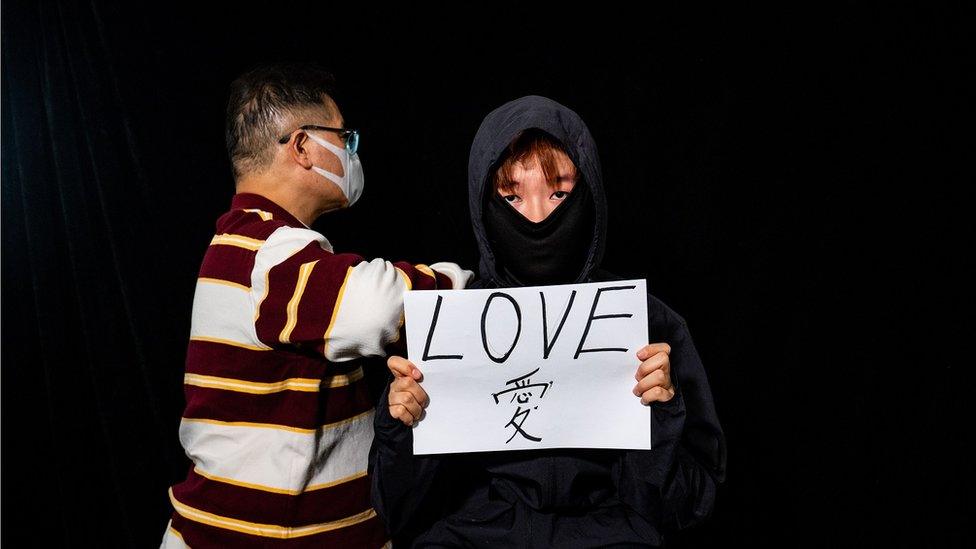Hong Kong: City of two masks faces a new crisis
- Published
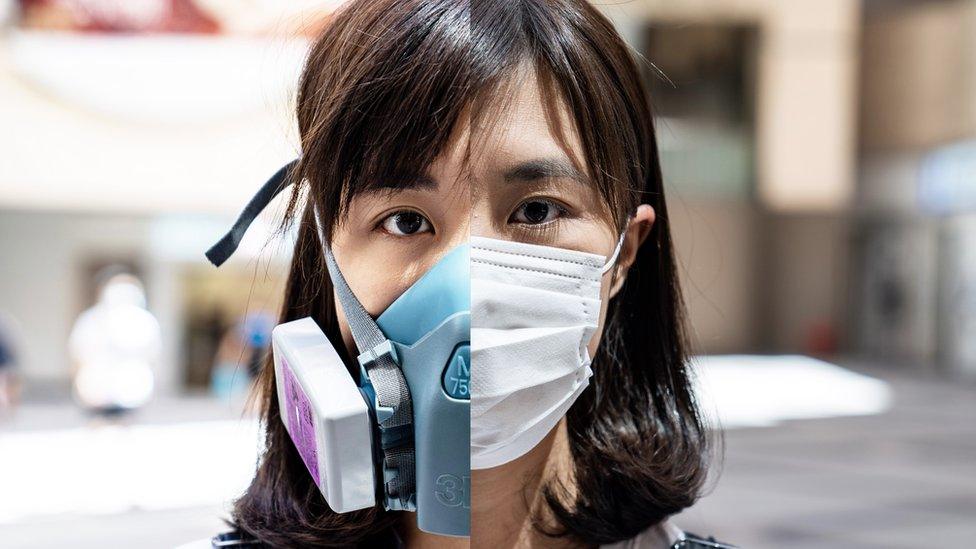

One year ago, black-clad youth of Hong Kong gathered outside parliament. Bricks and projectiles met rubber bullets and tear gas. Many protests and one pandemic later, the territory is facing another existential challenge. Will it survive?

In the past 12 months, almost everyone in Hong Kong has worn a mask for one reason or another.
For the protesters who fought pitched battles against police, it was a gas mask. For the peaceful demonstrators, it was a black face covering, to make a statement. For everyone else, it was a mask to protect against the pandemic sweeping the globe.
Scarred by the memories of the 2003 Sars epidemic in the city, almost every Hong Konger donned a mask, and somehow the city came through relatively unscathed - even as the rest of the world was plunged into sickness and crisis.
Then China made an announcement.
It planned to impose a national security law - one that would make crimes of what it called "subversion, secession, terrorism and foreign interference". The law is being drafted and is likely to be approved this month.
For the many critics of the proposed law, it is tantamount to making a crime of free speech, protest and dissent - and could mean the end of the unique freedoms guaranteed to Hong Kong when it was handed over to China in 1997.
"Hong Kong has entered a new stage. After what happened in the past year, Hong Kong could become totally different in the future," said Alice Cheung, a former student leader.
It has been a year of disbelief and mental exhaustion for Ms Cheung. She could not have imagined what her hometown would go through - and the many masks she would have to wear. Like many in the city - on all sides of the argument - her fear for the future is real and raw.
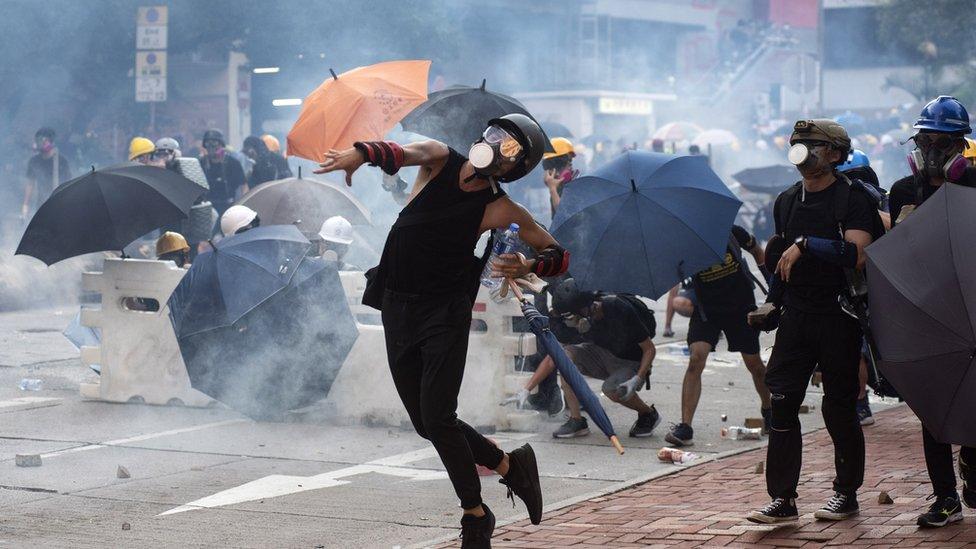
Frontline protesters wore masks to protect themselves against tear gas
Beijing sees this as a necessary crackdown on an unruly city. Hong Kong was always meant to introduce its own national security law, but never could because the prospect was so unpopular to its people. Now, after a wave of defiance, unleashed in response to China's attempt to impose a new extradition law, Beijing is doubling down.
Fears for a protest generation
For Ms Cheung and others like her the proposed national security law strikes at the heart of Hong Kong's civic political identity, its success as an international hub. But most of all it strikes at people's sense of belonging.
Yet some local opponents of the law say they welcome it, even though it could spell disaster for Hong Kong economically. To describe this sentiment, Ms Cheung uses the term "laam chau", Cantonese slang which means "mutual destruction". The theory goes, if Beijing cracks down on Hong Kong, the West will have to sanction China by revoking special treatment for Hong Kong, damaging China's economy in turn.
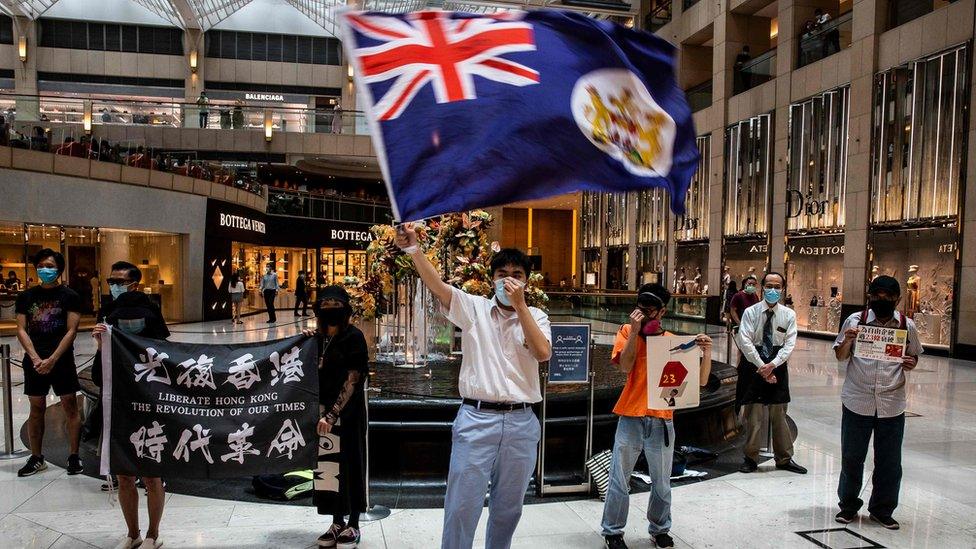
The colonial flag has become a fixture in Hong Kong protests
The US laid down the gauntlet last month by threatening to remove special privileges for Hong Kong and impose sanctions on Chinese officials who undermined the city's autonomy.
Once upon a time, colonial flag-waving protesters who wanted the UK to interfere in Hong Kong's affairs earned ridicule. Now, the UK has vowed, if Beijing goes ahead with its proposed law, to give greater rights to the three million Hong Kongers eligible for a British National (Overseas) passport, which was issued to residents born during the colonial era.
The implications of the UK's pledge are not small. Beijing has warned it will retaliate for any intervention in its internal affairs, and Hong Kong could become caught in the middle of a much bigger global dispute.
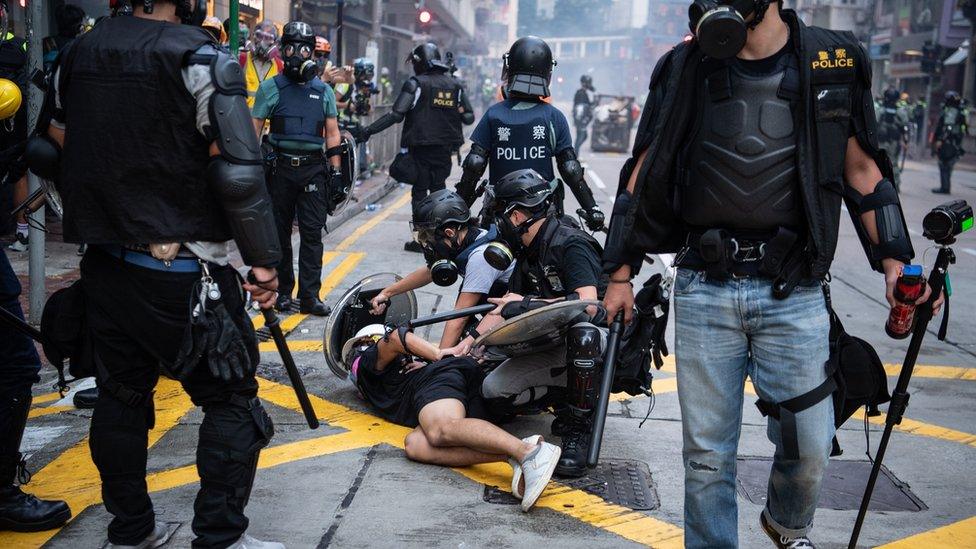
Police made nearly 9,000 protests-related arrests in the past year
Ms Cheung was a peaceful protester, but she does not want to distance herself from the violent frontliners - partly because she has taken on the profound mistrust of the police that became a rallying cry of the protesters.
She saw people like her arrested and it changed her view of who she was and what belonging to the city meaned to her. "I have become somewhat numb," she said. "I don't have a lot of feelings when I watch the news… I don't know if I am suppressing my feelings or what."
Nearly 9,000 people have been arrested - 40% of them students. The youngest was just 11 years old. More than 1,800 have been charged and about one-third of them now face a charge of rioting - an offence which carries a maximum sentence of a decade in jail.
Ms Cheung worries what will come of this protest generation if China's law is passed.
A unifying moment for the city
When the coronavirus came it filled her with dread. She grew up at Amoy Gardens, the housing complex which was the deadly centre of the Sars outbreak in 2003. More than 300 residents were infected.
The history behind Hong Kong's identity crisis and protests - first broadcast November 2019
Ms Cheung was just six at that time. "I remember how residents living at Block E had to board a bus to be quarantined at a government camp," she recalled. "I remember watching on television that the number of infections jumped every day."
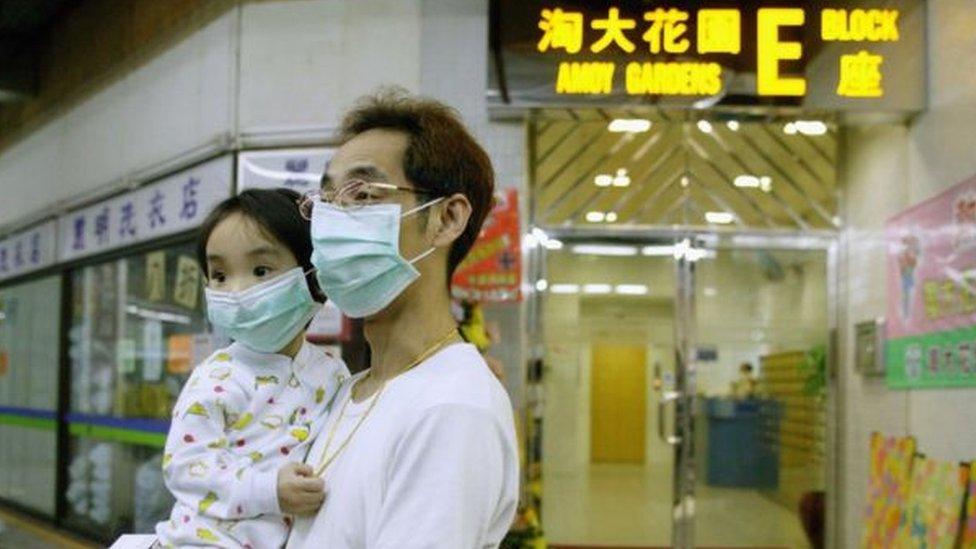
Hundreds of people from Amoy Gardens became sick during the Sars epidemic in 2003
Ms Cheung began wearing a face mask in early January, soon after she first heard news of a "mysterious pneumonia" in Wuhan.
"It reminded me of what happened during Sars," she said. "There would definitely be cover-ups, and I assumed things would fare worse than what was being reported."
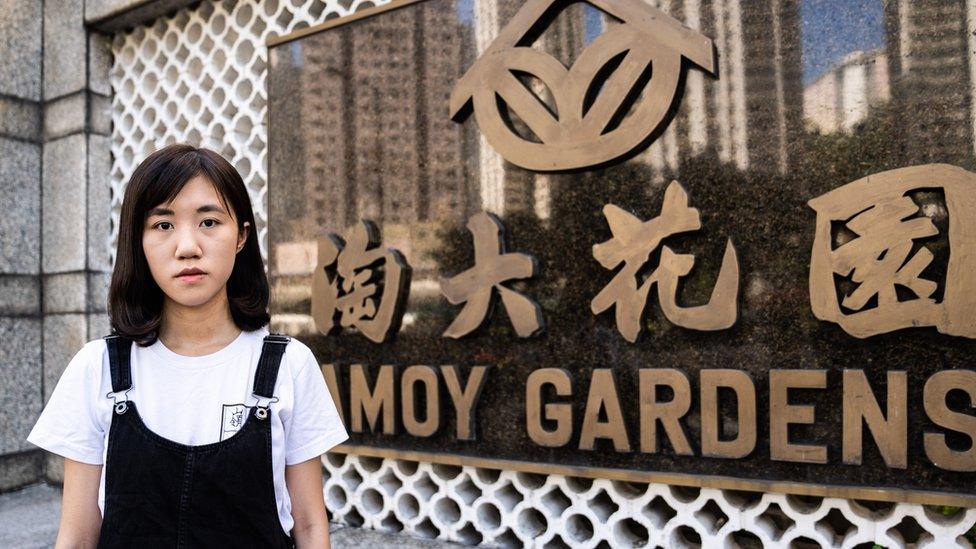
Ms Cheung still lives at Amoy Gardens, the centre of a 2003 Sars outbreak
Like Ms Cheung, many Hong Kongers sprang into action soon after mainland authorities confirmed human-to-human transmission. According to a study by the University of Hong Kong, nearly 75% of respondents said they used face masks when going out and about 61% said they avoided crowded places in late January. The figures jumped to 99% and 85% respectively in mid-March.
For a moment, the pandemic provided a lull from the months of protest and a unifying point for the city. Hong Kong has always taken pride in its can-do spirit. To many, surviving the pandemic was yet another example of what happens when people pull together.
The authorities had taken action, but the idea took hold among many that it had been primarily a triumph of the people.
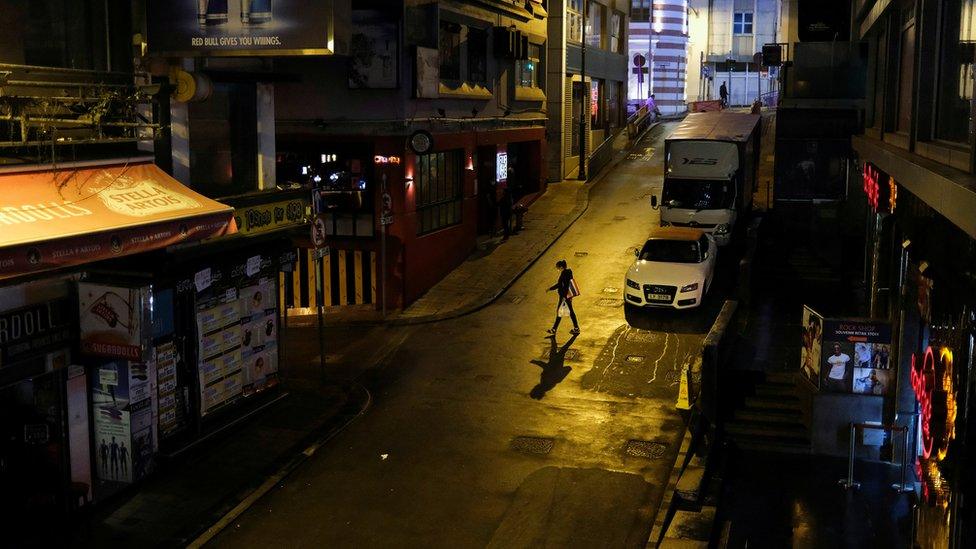
The streets in Hong Kong became empty during the peak of the coronavirus outbreak
Dr King-wa Fu, who teaches journalism at the University of Hong Kong, says that the city government reacted slowly in the early stages, cementing the perception that the community deserved credit, not the government.
"Hong Kongers have the Sars experience, and that's why people know what to do very quickly. Wear a mask, wash your hands frequently, and keep a social distance from people. We didn't really need the government to promote these messages," he said.
But whether or not it gets credit, experts acknowledge that the government has shown technocratic skill in managing the pandemic. Hong Kong has seen just four deaths, and no lockdown.
A cherished culture of protest
The announcement of China's proposed national security law relegated the successes of the virus response to a blip. The narrative of a people pulling together in a communal triumph simply evaporated.
Hong Kong's leader, Carrie Lam has said the proposed law must be enacted "because national sovereignty has been undermined by "the advocacy of independence and even violence verging on terrorist activities".
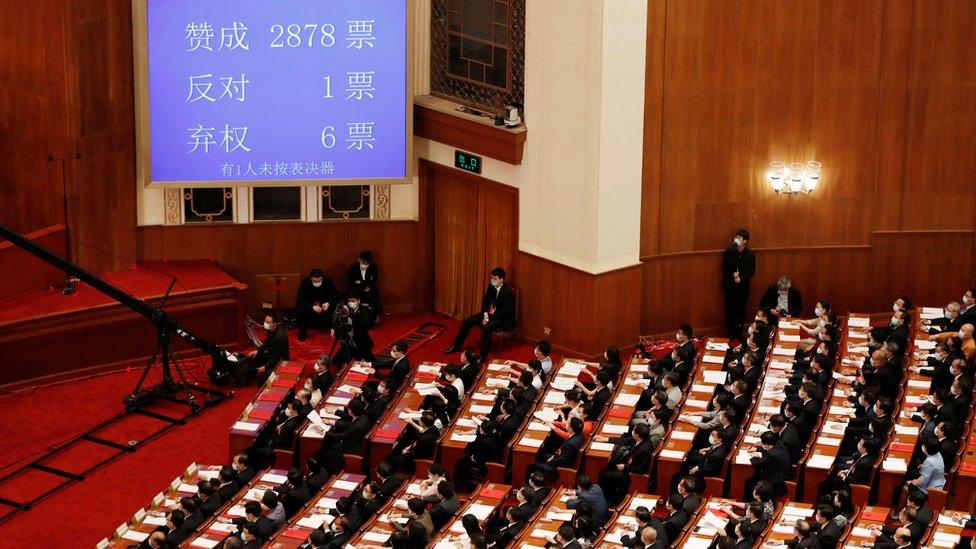
China's legislature nearly unanimously passed the resolution to draft a national security law in Hong Kong
Pro-democrats believe Beijing has been biding its time for years.
"China has always found it difficult to accept the kind of freedom and restraint to power that Hong Kong has under a separate system," said former lawmaker Margaret Ng.
"Now, they have chosen this way of imposing this law at the excuse of the protests last year. It gave them an opening, but they always wanted to do it."
Hong Kongers give their reaction to the controversial national security law in May
There are many fears about what the law could mean for Hong Kong, apart from a squeezing of civil liberties. Hong Kong's security chief, John Lee Ka-chiu, said on Wednesday police were establishing dedicated unit to enforce the new law, hinting that it would work closely with Beijing. There are fears China will set up more dedicated security organisations in the city.
Ms Ng, who is 72, said she feared speech itself could become a crime. In mid-April, she was arrested for the first time in her life, alongside 14 high-profile democracy activists.
Then there are fears for Hong Kong's cherished protest culture, which pre-dates the events of last year. It is a culture shaped in part by China's Tiananmen Square crackdown in 1989, when a million Hong Kong residents marched in support of the student protests in Beijing.
"People waited for four hours at Chater Garden before they could start marching. Back then, it was unprecedented and it was the biggest march," said Lam Wing-kong, who has worked for 31 years as a volunteer for the Hong Kong Alliance in Support of Patriotic Democratic Movements in China.
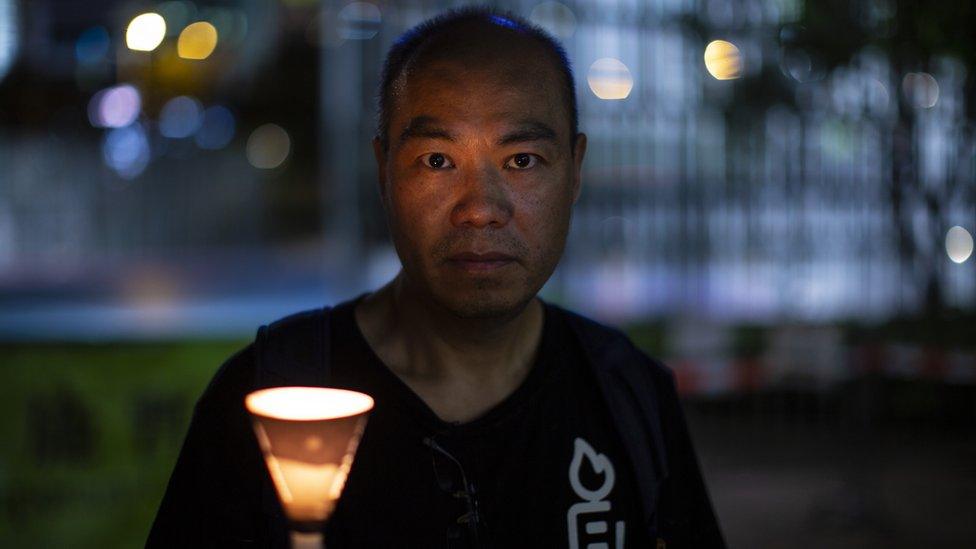
Lam Wing Kong worries there will be no more candlelight vigils commemorating the Tiananmen Square crackdown
Until this year, Hong Kong authorities had always allowed the vigil and it was seen as a yardstick of the city's civil liberties - such commemorations are not allowed in mainland China. This year, it fell under a ban on public gatherings which the government said was driven by public health concerns.
Still, tens of thousands came out to commemorate those killed during the Tiananmen Square crackdown, defying the ban.
Mr Lam worries that there will be no more candlelight vigils after the national security law takes effect.
Hong Kong's Justice Secretary Teresa Cheng told the BBC she believed the city was edging towards extreme levels of protest that needed to be dealt with. "Apart from the violence we see on the streets, you will have seen reports where bombs, petrol bombs, guns have been seized through the searches conducted by the police," she said.
She defended the proposed law, saying the autonomy of Hong Kong would "not in any way affected by this decision and the legislation that is going to come".
Changing economic realities
Many wonder if it is wise for China to go down this path, eroding Hong Kong's unique position as a part of China that enjoys the rule of law, an independent judiciary and certain freedoms.
But China has become a very different country than it was in the days before Hong Kong was handed over by the British. The advent of Xi Jinping, China's most assertive leader in decades has seen China embrace "comprehensive jurisdiction" over Hong Kong.
The risks are not inconsiderable. Brian Fong, a Hong Kong-based comparative political scientist, described the latest development as "a fundamental change in China's policy toward Hong Kong" - Beijing could risk losing access to foreign capital and technology through Hong Kong.
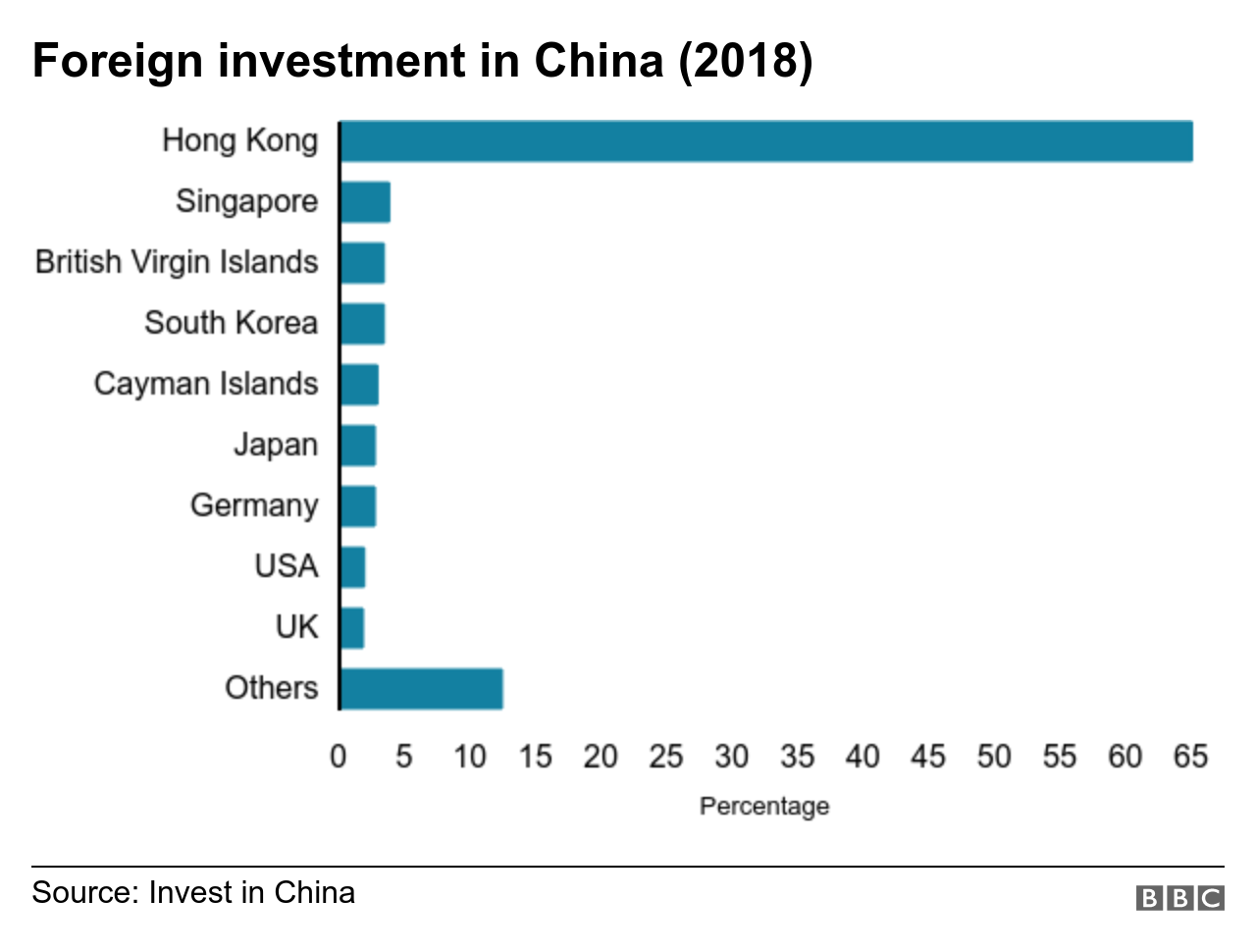
But the economic realities have changed too. In 1997, Hong Kong's economy was equivalent to 18% of China's economy. By 2018, it had fallen to less than 3%.
And after the announcement from China, offshore accounts, exchanging US dollars, and emigration have become hot topics among Hong Kongers.
Charles Chan (not his real name), a 40-year-old lawyer who makes between HK$1 million and $2 million a year, has made changes to his personal finances. "I will hold less Hong Kong dollars. I am also making preparations to move my money to offshore accounts," he said. Mr Chan is considering opening accounts in Singapore or Jersey.
No economic apocalypse has materialised so far: the Hang Seng index has recovered from an immediate sharp drop; the Hong Kong dollar, which is pegged to USD, remains strong; there has not been capital outflow.
But analysts predict the political storm could mean that Hong Kong will gradually lose its attractiveness as a base of regional headquarters for foreign multinationals - and the city's economy has already been battered by the protests and the virus.
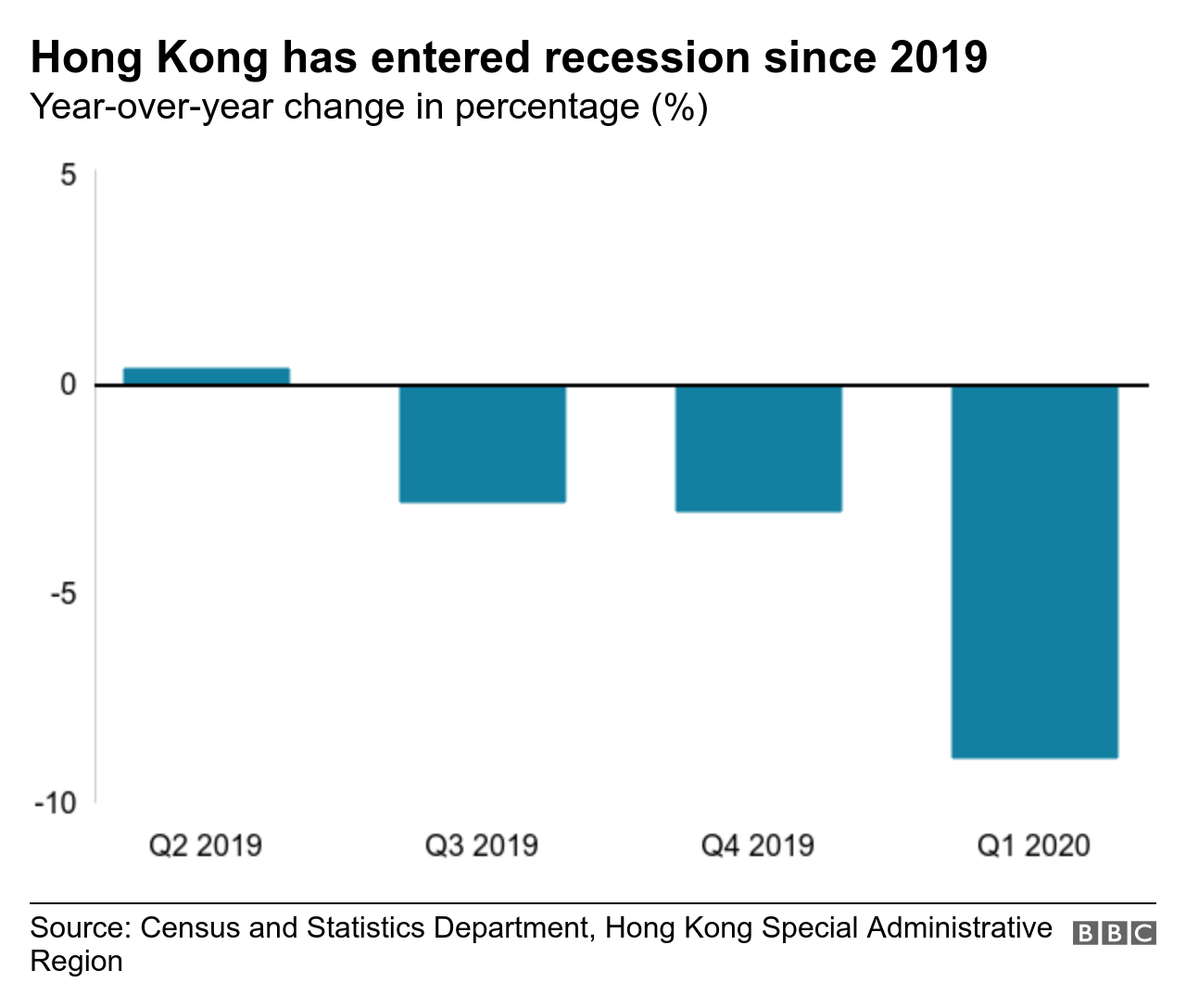
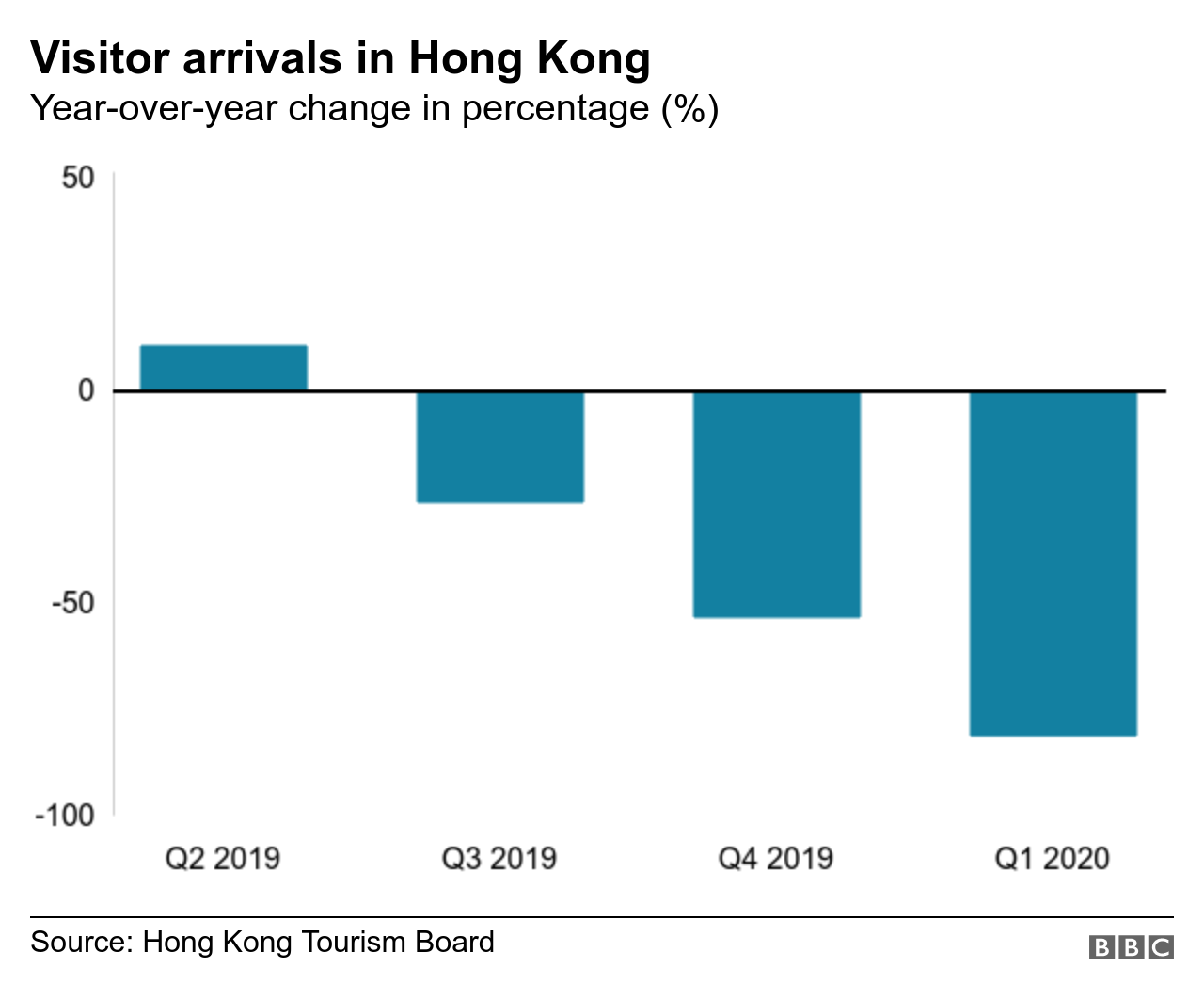
"A lot of the foundations of Hong Kong's success is now at risk," said Julian Evans-Pritchard, a senior China economist at Capital Economics.
"It's not just the Hong Kong national security law, even prior to this there were concerns. It just continues this trend… Even if the law itself turns out to not directly affect Hong Kong's legal system that much, just the perception of imposing it on Hong Kong has already deepened the concerns of the business community both within Hong Kong and internationally."
In the 1980s and early 1990s, Hong Kong experienced a wave of emigration. Tens of thousands of people left the city in fear of Communist rule. Mr Chan was among them, but he came back to build his career and start a family of his own.
"I have always planned to move once my children finish their primary education." he said. "If the situation in Hong Kong becomes really bad, the whole family will move."
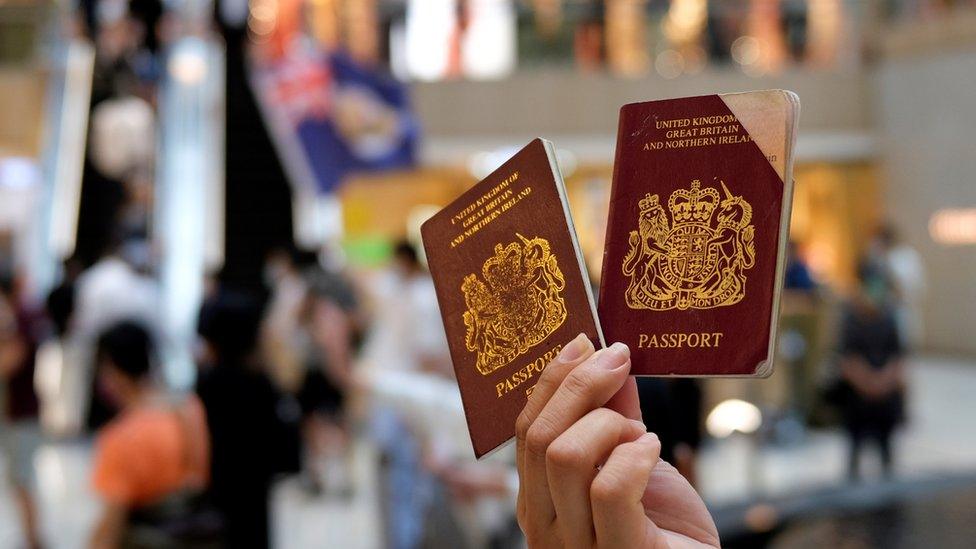
The UK said it could offer "path to citizenship" to BNO passport holders
He did not join the protests last year but felt sympathetic to the cause, he said. "Under China's system, there is only one voice. It clashes with Hong Kong's original system because people have different opinions and they can co-exist… I don't want my children to grow up under such totalitarian values."
There has not been a mass exodus yet, but there have been signs of growing interest in emigrating. "The BNO has been widely publicised and there is a jump in the number of Hong Kong residents renewing those passports," said Mr Evans-Pritchard.
Ms Cheung is a BNO passport holder. But she has no plans to leave Hong Kong, even after this year of tumult.
"You thought you relied on your own power and made the sacrifice to meet one goal, but Beijing now tells you the bill was withdrawn because I have a tougher solution to deal with you people," she said.
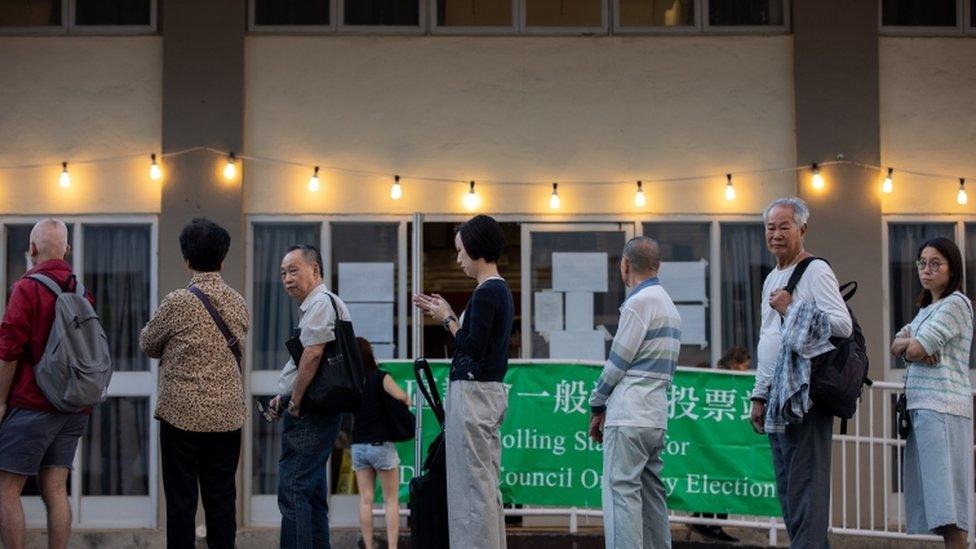
The district council election, which was held during the protests, saw a record turnout of 71.2%
The next significant moment in the city will be the legislative council elections in September. Everyone will be watching, after the pro-democrat successes in last year's district polls.
Ms Cheung looks forward in hope, she said, not despair, despite the political and economic uncertainty, despite the fear that Hong Kongers may decide to opt out of territory, or stay and fight to the bitter end.
"The world has entered an uncertain stage," she said. "At this moment, you can only be stronger mentally to make it through."
- Published19 March 2024
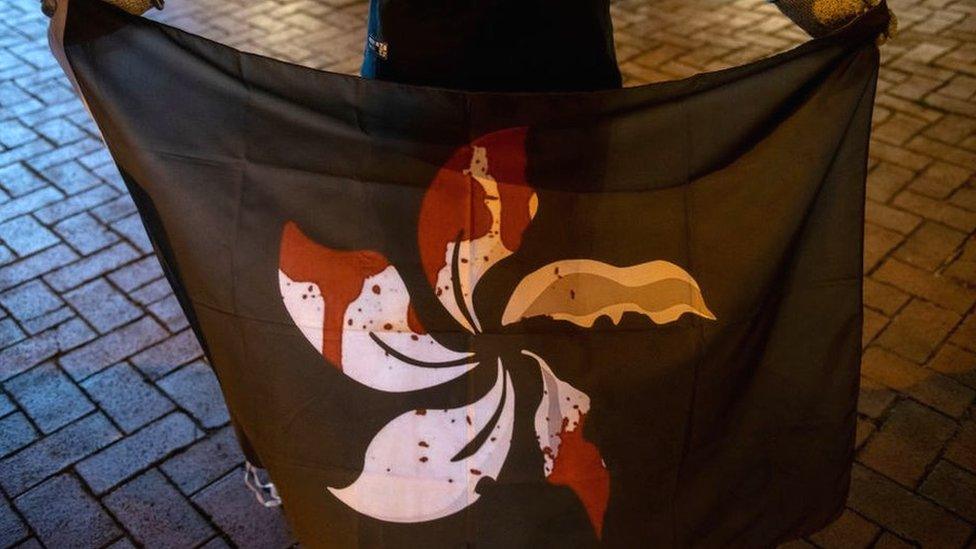
- Published21 May 2020
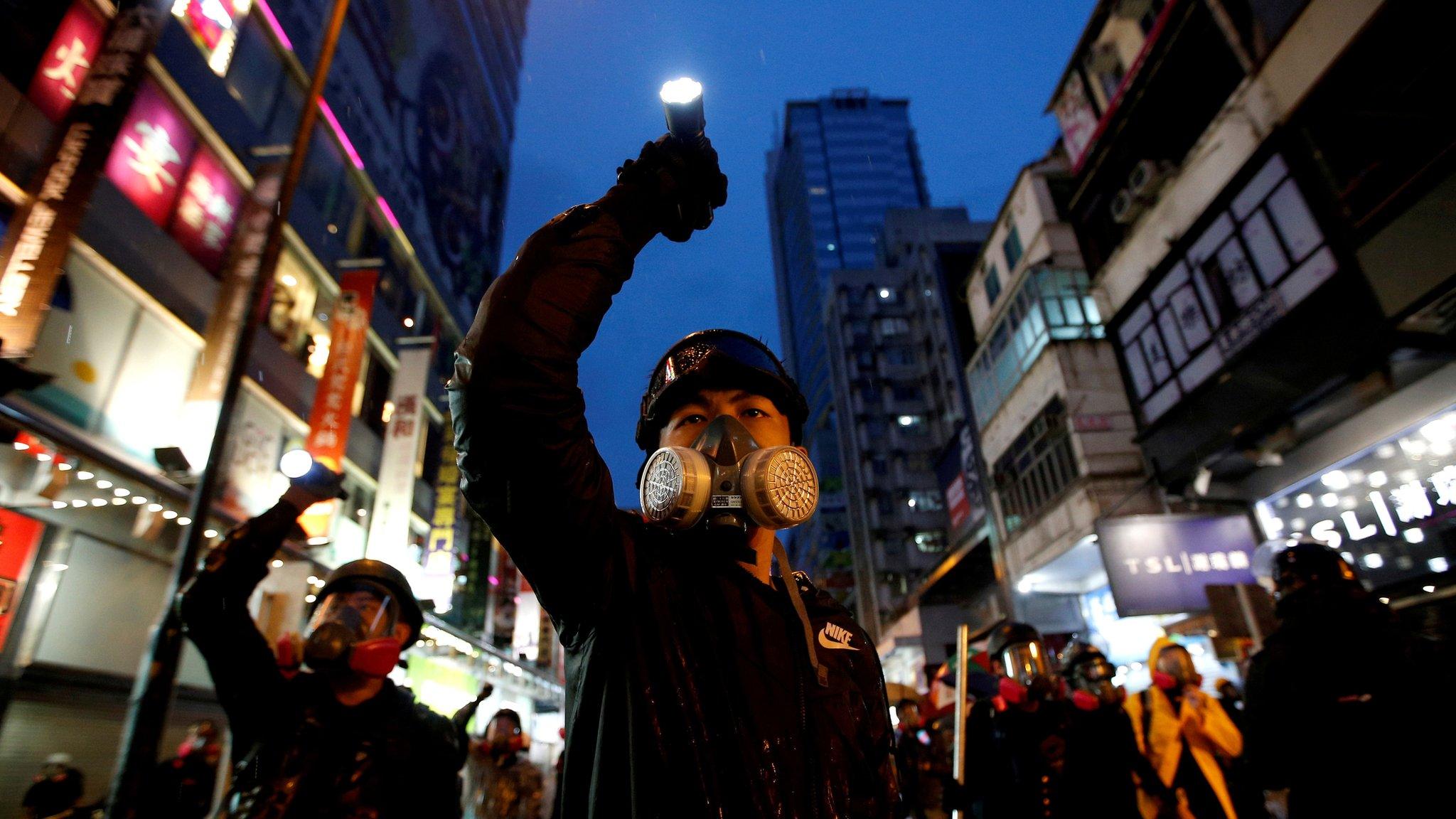
- Published28 December 2019
